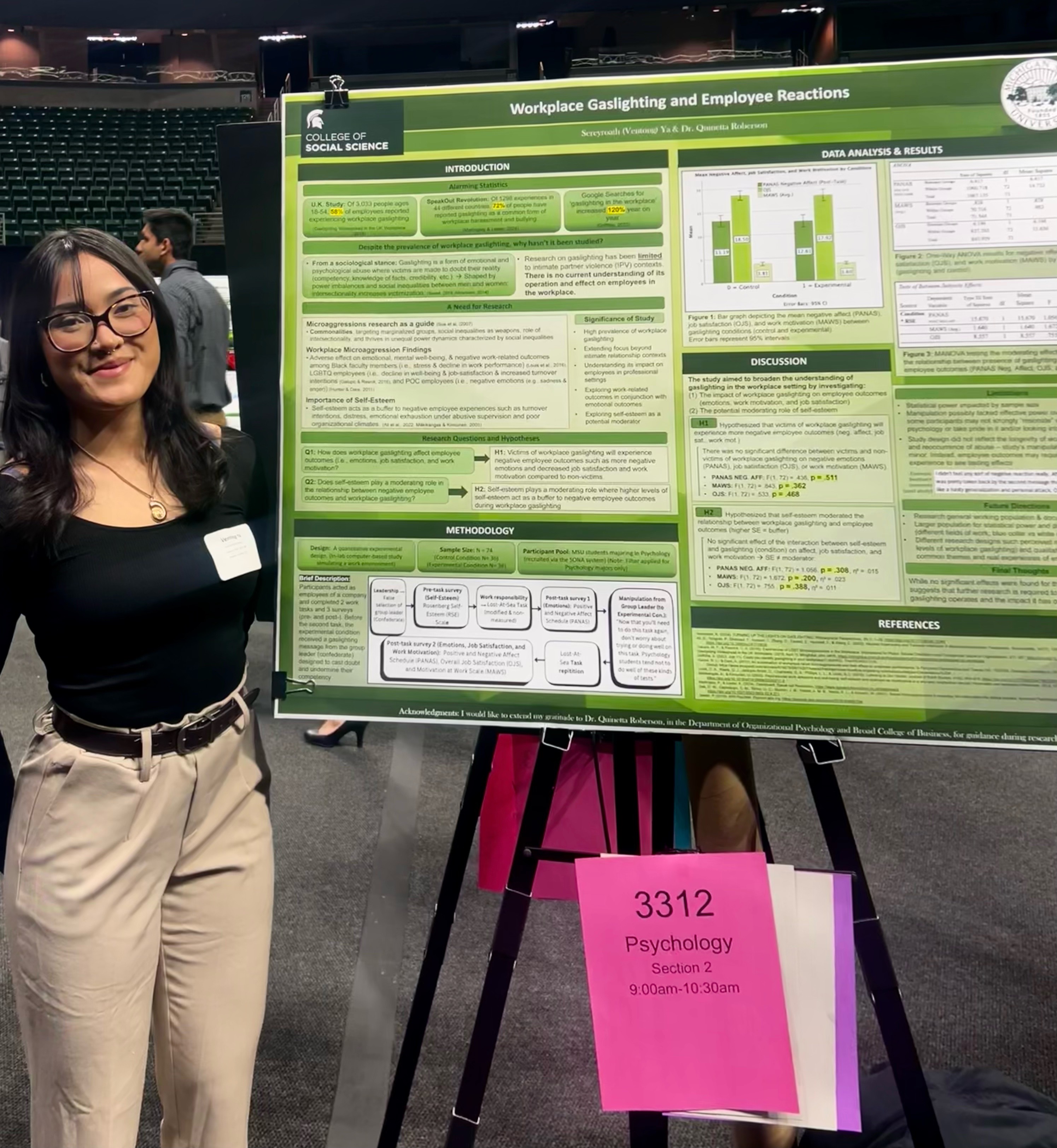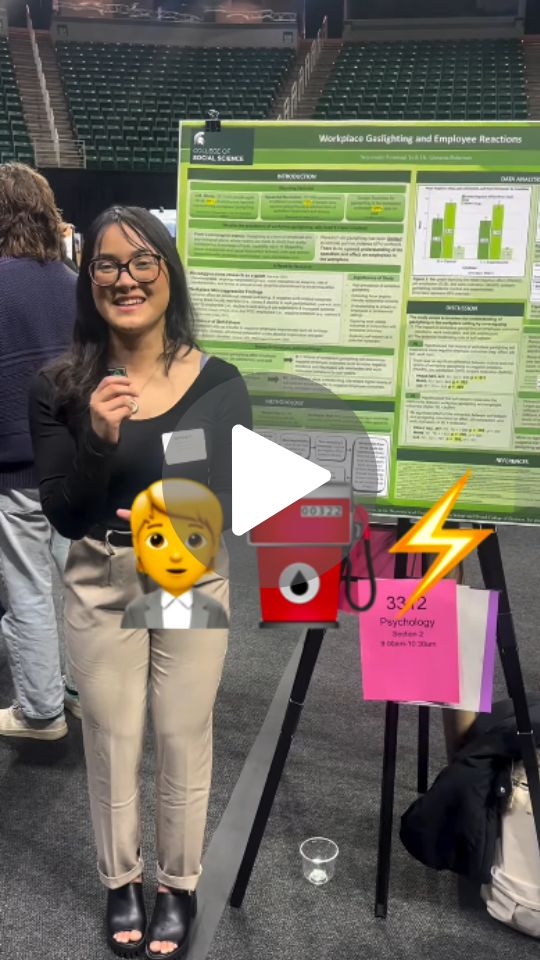PSY Research Spotlight with Ventong Ya
April 25, 2025 - Shelly DeJong
 Meet Ventong Ya, a psychology major in her third year with plans to graduate this spring. She’s been working on her honors research thesis with Dr. Quinetta Roberson this year and presented it at UURAF in April. Her project examines workplace gaslighting and how employees react to it. Continue reading to learn about Ventong’s research design, what surprised her about psychology research, and what advice she has for other MSU students.
Meet Ventong Ya, a psychology major in her third year with plans to graduate this spring. She’s been working on her honors research thesis with Dr. Quinetta Roberson this year and presented it at UURAF in April. Her project examines workplace gaslighting and how employees react to it. Continue reading to learn about Ventong’s research design, what surprised her about psychology research, and what advice she has for other MSU students.
How did you begin working with Dr. Roberson for your thesis?
Last year, I became really interested in industrial organizational psychology (IO psychology) and understanding behaviors in business. Before that, I had only considered clinical psychology; I wasn’t aware of IO psychology until I did some research online. I found it fascinating because I’ve worked in various environments and have always been interested in workplace dynamics and how people interact within businesses.
I knew I wanted to do a research thesis for an honors course, and I wanted to focus on a topic within IO psychology. I searched for business psychology professors and came across Dr. Roberson, whose research on diversity dimensions in the workplace caught my attention. One of her studies that stood out to me was about gaslighting in the workplace, which is what I chose as my thesis topic.
Tell us about your research project.
The title of my project is called “Workplace Gaslighting and Employee Reactions.” We want to examine how organizational gaslighting affects employees, specifically in terms of their emotions and work-related outcomes. We are interested in whether this workplace abuse leads to negative emotions and, if so, which specific negative emotions are prompted. Additionally, I plan to investigate how this workplace abuse influences work-related outcomes, such as job satisfaction and work motivation. Our research also explores whether higher levels of self-esteem serve as a buffer against these negative emotional and work-related outcomes, essentially determining if self-esteem plays a moderating role.
Over the summer last year, I started to do a literature review on the topic of gaslighting to see what research has been done already and what research still needed to be conducted. In the fall, we started running the experiments—and just now wrapped up collecting data!
So, our study uses a computer-based experimental design. We had participants engage in a work simulation where they are placed in an environment that mimics a workplace. They work on computers using the communications platform, Slack. They receive tasks from the designated group leader that simulate actual work responsibilities. During the experiment, I pretended to be another participant of the study, or another coworker, who is “chosen” as the group leader and who engages in gaslighting behavior during tasks. The gaslighting manipulation involved conveying a message that undermined their confidence and competency. We used the gaslighting message, "Now that you’ll need to do the task again, don’t worry about trying or doing well on this task. Psychology students do not do well on these kinds of tests." Since all participants were psychology students specifically recruited through the SONA system, this personal message could lead them to doubt their reality and abilities.
We had to take several precautions, in accordance with the Institutional Review Board (IRB) guidelines, including providing debriefing and contact information for support if necessary. Additionally, during the study, participants completed three surveys: one before the task and two after completing it. The surveys measured their self-esteem, emotions, job satisfaction, and work motivation.
Has anything surprised you about doing psychology research?
What has surprised me the most is the amount of work that goes into research. When you read a research paper, you see the literature reviews, the details of the experiments, and the data analysis. But when you actually do it yourself, you realize there is so much that happens behind the scenes. It's a lot of fun, but it can also be a bit scary, since this is my first time doing my own experiment alongside Dr. Roberson.
Would you like to give a shoutout to anyone?
Dr. Roberson has been tremendously helpful and is really great to work with. She has been a huge, huge, huge part of my experiment. She never makes me feel bad for not knowing things, and she’s always ready to help teach me.
Dr. Healey has also been helpful in answering my questions about the honors thesis and helping to connect me with Dr. Roberson.
Are you involved with anything else on campus?
I'm involved with MSU Habitat for Humanity, and I'm also a student ambassador with MSU’s Counseling and Psychiatric Services, or MSU CAPS. Essentially, I speak to other students on campus and provide them with information about CAPS. Many students may have never even heard of CAPS, so I explain what it is and let them know that they have access to free therapy sessions, since these are included in their tuition. It’s a great opportunity for me to connect with the community and also help people get the resources that are available to them.
Do you have any advice for other students?
My advice to other students is to take full advantage of the research opportunities available to you. Engaging in research helps enhance your critical thinking skills, and it encourages creativity in your research designs and approach to problem-solving. It also improves your writing skills a lot and allows you to build relationships with professors. Overall, engaging in research helps you grow as a person. I’ve learned so much through this experience.


